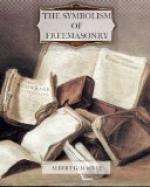Another illustration will be found in the myth or legend of the Winding Stairs, by which the Fellow Crafts are said to have ascended to the middle chamber to receive their wages. Now, this myth, taken in its literal sense, is, in all its parts, opposed to history and probability. As a myth, it finds its origin in the fact that there was a place in the temple called the “Middle Chamber,” and that there were “winding stairs” by which it was reached; for we read, in the First Book of Kings, that “they went up with winding stairs into the middle chamber.” [151] But we have no historical evidence that the stairs were of the construction, or that the chamber was used for the purpose, indicated in the mythical narrative, as it is set forth in the ritual of the second degree. The whole legend is, in fact, an historical myth, in which the mystic number of the steps, the process of passing to the chamber, and the wages there received, are inventions added to or ingrafted on the fundamental history contained in the sixth chapter of Kings, to inculcate important symbolic instruction relative to the principles of the order. These lessons might, it is true, have been inculcated in a dry, didactic form; but the allegorical and mythical method adopted tends to make a stronger and deeper impression on the mind, and at the same time serves more closely to connect the institution of Masonry with the ancient temple.
Again: the myth which traces the origin of the institution of Freemasonry to the beginning of the world, making its commencement coeval with the creation,—a myth which is, even at this day, ignorantly interpreted, by some, as an historical fact, and the reference to which is still preserved in the date of “anno lucis,” which is affixed to all masonic documents,—is but a philosophical myth, symbolizing the idea which analogically connects the creation of physical light in the universe with the birth of masonic or spiritual and intellectual light in the candidate. The one is the type of the other. When, therefore, Preston says that “from the commencement of the world we may trace the foundation of Masonry,” and when he goes on to assert that “ever since symmetry began, and harmony displayed her charms, our order has had a being,” we are not to suppose that Preston intended to teach that a masonic lodge was held in the Garden of Eden. Such a supposition would justly subject us to the ridicule of every intelligent person. The only idea intended to be conveyed is this: that the principles of Freemasonry, which, indeed, are entirely independent of any special organization which it may have as a society, are coeval with the existence of the world; that when God said, “Let there be light,” the material light thus produced was an antitype of that spiritual light that must burst upon the mind of every candidate when his intellectual world, theretofore “without form and void,” becomes adorned and peopled with the living thoughts and divine principles which constitute the great system of Speculative Masonry, and when the spirit of the institution, brooding over the vast deep of his mental chaos, shall, from intellectual darkness, bring forth intellectual light.[152]




